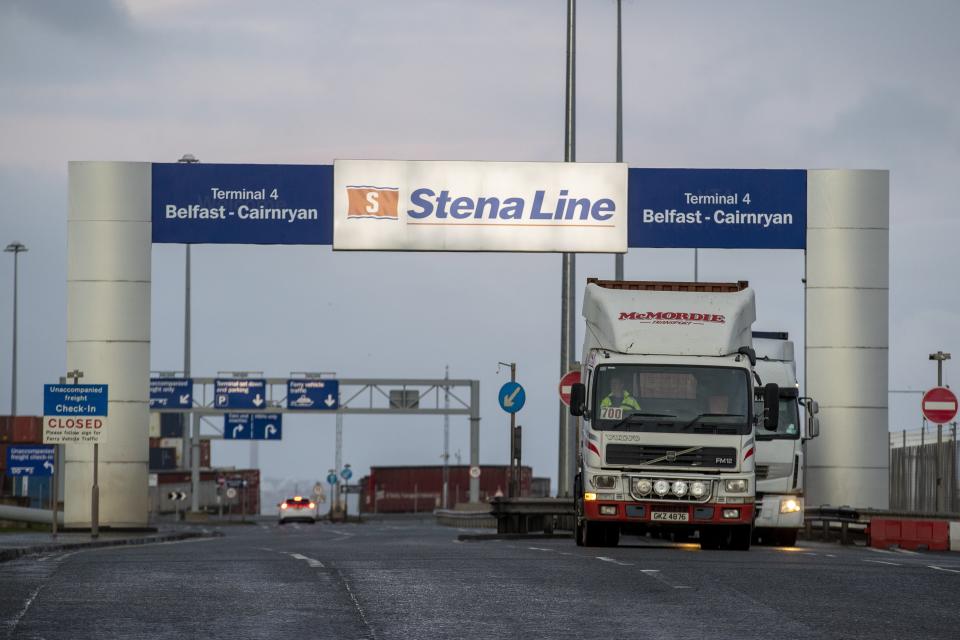Over half of UK hauliers ‘making or considering operations move to EU’ as Brexit bites, new survey finds

Over half of British haulage firms have already made or are considering moving some operations into the EU due to a "perfect storm" of post-Brexit red tape impacts and driver shortages still hitting the sector, a new report has found.
Haulage Exchange, a company that provides technology for the logistics industry, polled management at 16 of the UK's largest haulage companies with operations in Europe.
The survey revealed that ongoing border delays, driver shortages, and increased admin time and costs are all major challenges being faced by firms in the sector.
Of trucking leaders surveyed, 81% said they have experienced increased border waiting times and 69% said they now spend more time doing admin before crossing into the EU than pre-Brexit. Just 6% of companies said they had seen no impact on their business since Brexit on 1 January.
The study stated that in what represents "a potentially seismic shift", a total of 56% of haulage companies surveyed said they had already moved some operations to the EU, or would consider it in the future.
A further 19% said they have dealt with the issues faced by no longer doing business with EU companies.
The report found many respondents had explored alternative routes into the EU as an alternative to moving bases, but that half of those surveyed experienced longer journey times on those routes.
It comes as haulage demand soars, in part due to the pandemic-fuelled rise in e-commerce. Demand was up 120% on 2019 levels in April this year, and nearly double 2019 levels in May, the survey found.
Retail and agricultural firms are already seeing supply chain issues, and the report also warned that rising haulage costs will likely “be felt by UK businesses in various industries" in the coming months.
Nearly 70% of hauliers surveyed had already increased their prices as a result of the issues they are facing, with the remaining 31% saying "costs will be rising next year or in the near future".
Nearly a third of respondents said they would avoid working with food and drinks industry clients due to border and red tape issues.
Full border inspections will begin on January 1 2022, and the report found 69% of hauliers expect to be further negatively affected by the change.
The report concluded: "Even at this early stage, it’s clear that Brexit has had a profound effect on the UK’s haulage industry. When we asked hauliers just how Brexit has affected them, 69% said it has caused them to lose business, while 19% are no longer working with EU companies. In addition, a quarter feel unable to plan properly due to ongoing uncertainty."
Since January 1, companies have had to fill in new forms such as export health certificates and declarations, with many facing complex new duty rules. In the early days it left truckers with the wrong paperwork stranded at borders across the Continent, or even - as in the case of some Scottish seafood exporters - seeing food go to waste.
In the weeks following Brexit in January, data from logistics software firm Transporeon, which tracks lorry flows through Europe in real time, showed lorry drivers were already spending an average of 3% to 5% longer navigating UK borders as a result of post-Brexit red tape.
In the months since consumers may have noticed small changes - additional charges for parcels coming from the EU, for example - and read headlines about the so-called "sausage war" over the import of chilled meats to Northern Ireland from Great Britain.
Haulage Exchange founder and CEO, Lyall Cresswell, said: “It’s clear that haulage companies will have to continue to be flexible, especially with further Brexit changes around the corner.”
Read More
More than 200 symptoms for long Covid - study
Londoners planning ‘nomadic working’ summer in UK, new survey finds
FTSE 100 leisure stocks lift as traders take a punt on Freedom Day

 Yahoo Finance
Yahoo Finance 